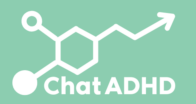This article is an edited and simplified transcript from an interview conducted by Laura Leoncini from the podcast Job Tales December 2024. For the full audio interview, click here.
Welcome to Job Tales – the podcast that brings you real stories from professionals across industries!
Today’s episode is all about ADHD coaching. I’m thrilled to have Carolina De La Torre Ugarte as our guest. She’s an ADHD coach who helps individuals harness their strengths and overcome challenges in both their personal and professional lives. Carolina, welcome to Job Tales.
Q: What is ADHD?
Carolina: ADHD stands for Attention Deficit Hyperactivity Disorder. It’s a neurodevelopmental condition, meaning it begins in utero—our brains develop in a way that affects executive functioning. Executive functions are things like planning, organizing, weighing pros and cons, and making decisions. These processes depend heavily on dopamine and other neurotransmitters.
In someone with ADHD, the brain’s dopamine threshold is higher. So even if you want to do something, like start a task or respond to an email, the brain might struggle to “activate” without enough dopamine. That’s the attention part of ADHD.
The hyperactivity part isn’t always physical. Mental hyperactivity is common—imagine having several conversations and songs playing in your head at once. It can feel overwhelming and overstimulating.
Q: Is ADHD something new, or has it always existed?
Carolina: It’s definitely not new. ADHD-like symptoms were first documented in the late 1800s in psychiatric literature. The way society is structured now—favoring predictability and 9-to-5 routines—can make ADHD more noticeable or difficult to manage.
There’s also the perspective that ADHD is less about being a disorder and more about a different way of thinking. If society were more inclusive (like if every building had ramps by default), ADHD might not be viewed as a disability at all.
Q: How do you help individuals with ADHD?
Carolina: First, I listen. Many clients feel alone in their struggles—difficulty starting tasks, focusing, or following through. Through psychoeducation, I help them understand how their brain works, and most importantly, that they’re not alone.
Then, we move into action—creating structures and systems based on what they want to do, not what they feel they should do. I describe ADHD coaching as applying project management tools to your daily life. And yes, self-discipline is part of it, but so is self-compassion. You won’t be perfect every day, and that’s okay.
Q: Is it challenging to coach others with ADHD while having it yourself?
Carolina: When I do share personal stories, I always include the disclaimer: this is my experience, not the model. I bring in my background in anthropology and sociology to understand the diversity of experiences. Intersectionality is key—our identities shape how ADHD affects us. I’m a white-presenting Latina who immigrated to Switzerland. My experience is different from others, each person’s experience is unique, and I make sure to highlight that.
Q: What led you to become an ADHD coach?
Carolina: I originally wanted to become a prison psychologist. I studied psychology and sociology and became interested in systemic issues in mental health. When I moved to Geneva, I continued studying sociology and anthropology, focusing on prison reform and alternatives to incarceration.
Eventually, I was diagnosed with ADHD myself. I’d already worked in organizational psychology and wanted to combine my experience with coaching. My long-term goal is to become a re-entry coach for people coming out of prison. Many, like so many outside of prison, are incredibly smart and creative—they just need support.
Q: What are you most proud of?
Carolina: I’ve started many projects—podcasts, books—that I didn’t finish. But with coaching, I’ve stuck with it. I’ve built consistency despite the voice in my head saying I’ll give up. That’s thanks to support from mental health professionals, my family, and learning how to work with my brain, not against it.
Q: When did you start coaching?
Carolina: I began coaching in July 2024, and I’ve been visiting prisons since 2020. My past experiences, like prison visits, taught me to listen without judgment, which is essential for coaching. I’ve always focused on staying curious instead of being critical.
Q: What skills are important for ADHD coaching?
Carolina: Soft skills include active listening, patience, and the ability to stay present with clients. Hard skills include understanding neuroscience, being able to read scientific studies, and communicating with medical professionals.
You also need admin skills—emailing, invoicing, scheduling. Personally, I also love using my creative skills to create visuals and metaphors in coaching, which help clients conceptualize their experiences.
Q: Do you coach in person or online?
Carolina: Both, but I love online coaching because I can use visual tools and interactive activities. Sharing screens and working in real time is very effective, especially for ADHD.
Q: Any advice for those interested in ADHD coaching or managing ADHD?
Carolina: Yes—don’t aim for perfection. People say “shoot for the moon,” but with ADHD, consistency is more important than ambition. Your goals need to be achievable even on a bad day. “Shoot for the moon” is a great idea for a vision in the long-term and less so for a daily goal.
Set realistic goals and build from there. This applies to everyone—not just people with ADHD.
Carolina, thank you so much for sharing your journey. Your work is inspiring, and I wish you the best as your career continues to grow.
Carolina: Thank you, Laura!
That was Carolina sharing her journey as an ADHD coach. If you enjoyed this episode, check out more on Job Tales. Find us on Spotify, YouTube, Apple Podcasts, or at wrs.worldradio.ch. Thanks for tuning in—see you next time for another inspiring career story.
